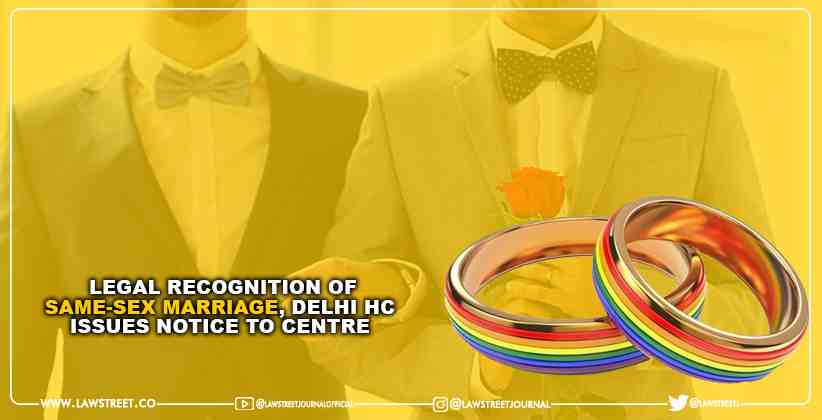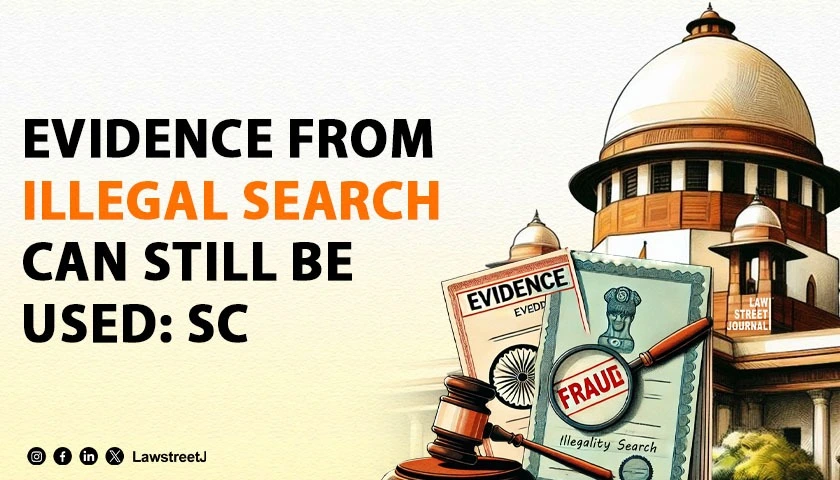On Tuesday(06/7/2021) The Delhi High Court issued notice to the Centre in a petition seeking a declaration that the right to legal recognition of same-sex marriage is a fundamental right under Articles 14, 15, 19 and 21 irrespective of a persons gender, sex or sexual orientation.
The petition also sought to declare that a spouse of foreign origin of an Indian citizen or Overseas Citizen of India (OCI) cardholder is entitled to apply for registration as an OCI under the Citizenship Act regardless of the gender, sex or sexual orientation of the applicant spouse.Plea Filed by Joydeep Sengupta, who is a Canadian citizen and an Overseas Citizen of India (OCI) cardholder, and his partner Russell Blaine Stephens, the petition has prayed for a declaration from the Court that "a spouse of foreign origin of an Indian Citizen or OCI cardholder is entitled to apply for registration as an OCI under the Citizenship Act regardless of the gender, sex or sexual orientation of the applicant spouse."
A Division Bench of Chief Justice DN Patel and Justice Jyoti Singh asked Centre and others to file a reply on the fresh petition and listed it for further hearing on August 27.
The fresh petition was filed by advocates Karuna Nundy with lawyers Ruchira Goel, Utsav Mukherjee, Ragini Nagpal and Abhay Chitravanshi.
Facts of the case
The petitioners are a married same-sex couple resident in Paris, France. They met in New York in 2001 and have been in a loving relationship for nearly 20 years. The petitioners got married in New York on August 6, 2012, and are recognized as a legally married couple in the US, France, and Canada - the three countries where they have primarily lived and worked in the last 20 years and now they are preparing for their new role as parents, and they are expecting their first child in July 2021.
One among the couple is of Indian origin and now he sought to attain OCI status at the earliest in order to avail of this facility so that he can spend time in India - where the petitioner's family lives - with his spouse and the baby they are expecting and indeed, to reach his husband and baby immediately in case of illness or other difficulties as needed during the pandemic.
The present petition sought a declaration that a spouse of foreign origin of an Indian Citizen or OCI cardholder is entitled to apply for registration as an Overseas Citizen of India under Section 7A(1)(d) of the Citizenship Act, 1955 regardless of the gender, sex or sexual orientation of the applicant spouse.
The petitioners also sought legal recognition of all same-sex, queer or non-heterosexual marriages under secular legislations for marriage such as the Foreign Marriage Act 1969 and the Special Marriage Act 1954 in accordance.
The petition sought direction in the nature of a declaration that since section 7A(1)(d) of the Citizenship Act, 1955, does not distinguish between heterosexual, same-sex or queer spouses, a person married to an Overseas Citizen of India, whose marriage is registered and subsisting for two years, be eligible to apply as a spouse for an OCI card.
The plea also stated that,Because ones right to marry an individual of their choice is a freedom accorded to every person under Article 19, and read with Article 21, their right to privacy allows them the inviolable right to determine how this freedom is exercised.
After hearing the couples petition, a division bench of Chief Justice DN Patel and Justice Jyoti Singh sought responses from the Ministry of External Affairs, the Ministry of Home Affairs and the Consulate General of India in New York.In a batch of similar pleas, the Delhi High Court vide its order dated May 24, 2021, directed the matter to be listed Tuesday(06/07/2021), after Solicitor General Tushar Mehta pointed out that the subject-matter of these petitions was not in the roster of the Bench before which the matters were marked.
However, Solicitor General Tushar Mehta had refuted the submissions arguing that marriage certificates are not necessary for admissions in hospitals.Earlier, opposing the petition seeking recognition to same-sex marriages under various personal laws, the Centre had told the court through an affidavit that, "there is a "legitimate state interest" in limiting recognition of marriage to persons of opposite sex only", and that the institution of marriage is not merely a concept relegated to the domain of privacy of an individual.
The centre had also said that contrary to the popular view that homosexuality was legalized by the Supreme Court in the case of Navtej Singh Johar v. Union of India, the court had "only made a limited declaration to decriminalize a particular human behavior, which was a penal offence under S.377 IPC. The said declaration was neither intended to, nor did in fact, legitimise the conduct in question."Observations in 'Puttaswamy Judgment'(Privacy Case) and 'Navtej Johar' case(which struck down Sec 377 IPC) do not confer a fundamental right to seek recognition of same-sex marriages, it had Centre argued.[Udit Sood and Ors. v. Union of India and Anr.]








